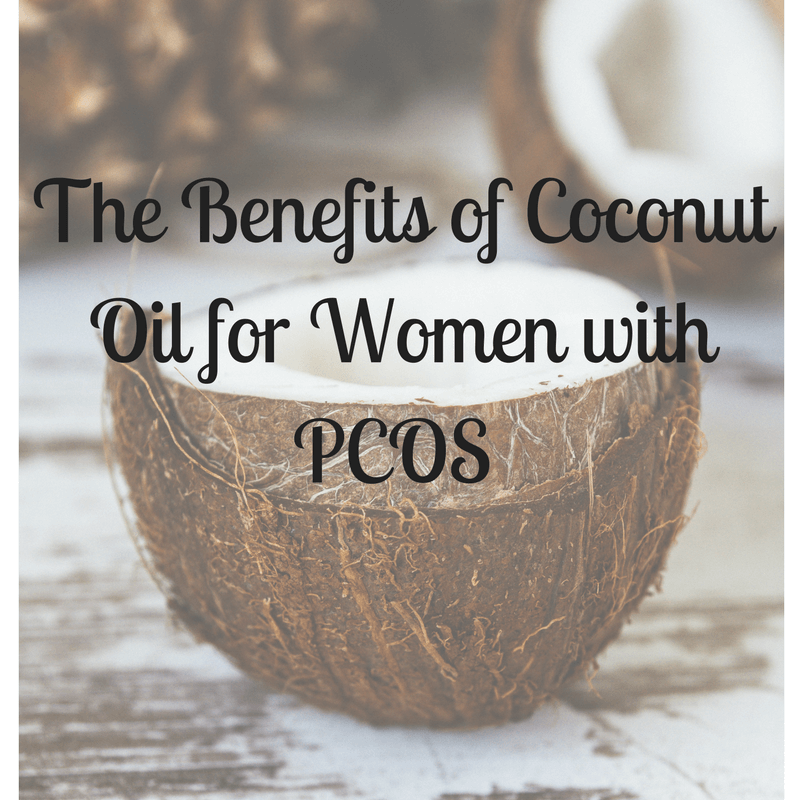
by AmyPlano | Jan 6, 2017 | PCOS and Fats, Weight Loss
The Nutritional Benefits of Coconut Oil for Women with PCOS
Did you know there are many nutritional benefits of coconut oil – especially for women with PCOS? In this blog, I discuss the nutritional benefits of coconut oil, what terms to look for when purchasing, as well as how to incorporate coconut oil into your current PCOS lifestyle. If that is not exciting – then I don’t know what is 🙂
It seems like no matter where you turn – social media, twitter, newspapers (yes, they do STILL exist!) or even your best friend – someone is talking about coconut oil. They may not know what they are talking about – but they are still talking!
Some folks say coconut oil is “bad” while other experts tout it as the next superfood. So what’s a girl with PCOS to do? Should you go out and buy jars of it? Or should you drop it like it’s hot and hope everyone stops talking this tropical oil?
Well fret not ‘cysta! The PCOS Dietitian is here to give you the 411 on coconut oil.
What the heck is Coconut oil?
To make coconut oil, manufacturers press the fat out from the white “meat” inside a coconut. Coconut oil consists mostly of saturated fatty acids. When most people think of the word “oil”, they think of a liquid fat like olive or avocado oil. However, due to its saturated nature, coconut oil it is actually solid at room temperature! If you have never seen it before, it actually looks pretty similar to shortening. However, thankfully it has none of the icky properties of that yucky oil!
Soooooooooo … I know what you are thinking. You just heard the nasty word saturated fat and you are officially in freak out mode. Hang in there ‘cysta I have some good news that is going to blow your mind.
The Super Hero of Coconut Oil – Medium Chain Triglycerides
Coconut oil’s saturated fats are primarily composed of medium chain triglycerides or more commonly known as MCTs. MCTs behave differently than other saturated fats in the body and because of this factor have a positive effect on many of the systems in the body.
Warning – it’s about to get nerdy! Skip this paragraph if you just want the ‘cliff’ notes version! MCTs get their name because of the length of their chemical structure. All types of fatty acids are made up of strings of connected carbon and hydrogen atoms. Fats are categorized by how many carbons they have: short-chain fats have fewer than six carbons, medium-chain fats have between 6–12 carbons and long-chain fats have between 13–21 carbons. Why do we even care about this nonsense you ask? Well because they are smaller, MCTs get into our cells easier and are quickly absorbed.
MCTs are powerhouses. They have soooooo … many benefits!

So many benefits of MCTs
MCTs can help promote weight loss, decrease hunger, stabilize blood sugar and enhance immune and cognitive functions. Many studies also support MCT’s role in thyroid health. MCT oils have multiple benefits relating to cardiovascular health such as the ability to decrease total cholesterol as well as triglycerides.
What KIND of coconut oil should I buy?
Just like everything in the food industry today, some coconut oils are healthier than others. Two types of coconut oils exist – refined and unrefined. Can you can guess which one is the healthier of the two!?!
Refined Coconut Oil
Refined coconut oil is subjected to various chemical solvents, deodorizers and bleaches. In the refining process, coconut oil is exposed to high temperatures. Many of the refined coconut oils on the market also contain trans fats. Trans fats have a negative impact on heart health. Refined coconut oil is tasteless, odorless, and no surprise has a lower nutrient content. Avoid refined coconut oil like the plague.
Unrefined Coconut Oil
On the other hand, unrefined coconut oil aka virgin coconut oil, extra-virgin coconut oil or raw coconut oil is unadulterated. It is minimally processed which means it has a higher nutrient content. When you open up a jar of coconut oil – it smells like it should – like coconuts! If it is does not smell like coconuts, it is likely refined.
Additional terms to describe coconut oil
You may also hear the terms “expeller-pressed coconut oil” and “cold-pressed coconut oil.” Expeller-pressed coconut oil goes through a harsher process at a higher temperature which results in a loss of nutrients. Cold-pressed coconut oil is processed at a lower temperature and the greatest amount of nutrients are preserved.
Lastly, you want to see the term “organic” on the label as well. This guarantees that the oil is not produced through genetic engineering.
So, in short, look for the words organic, cold-pressed and unrefined when purchasing coconut oil.
Where can I buy coconut oil?
You can find coconut oil at most grocery stores, health food stores, and even some drug stores. In grocery stores you can find it in the natural foods aisle. I have also pleasantly seen coconut oil in stores like Costco, Trader Joe’s and even TjMax! Depending on the size, coconut oil can cost anywhere from $6.00 – $20.00 per jar. Make sure it is solid not liquid when you buy it. Keep it in cabinet to decrease its exposure to light or high temperatures. When the temperature is above 75 degrees – the coconut oil turns into an oil! So be careful.
How can coconut oil specifically help women with PCOS?
Unrefined, organic coconut oil has the potential to help women with PCOS in a variety of ways. Below are just a couple of the what I feel are the most important benefits.
Blood glucose levels. Many women with PCOS often experience unstable blood sugar levels. This can lead to dizziness, irritability, fatigue and increased hunger. Coconut oil can help stabilize blood sugar levels. Some studies have also demonstrated that coconut oil can also have a favorable impact on insulin secretion. Double win!
Improves blood lipid profile. The risk of getting heart disease increases when you have PCOS. Coconut oil can help raise levels of HDL (along with a consistent exercise program, of course!) or what we call our good cholesterol. It also can help reduce the level of fat (triglycerides) in the blood. (But be mindful it can also raise LDL cholesterol – or your lousy cholesterol – a number which you want low!) This is especially beneficial for women with PCOS ♥
Helps with hypothyroidism. While thyroid issues do not soley exist in this demographic, they can nonetheless be extremely problematic in women with PCOS. Coconut oil helps improve thyroid function and speeds up fat breakdown.
Weight maintenance. By nature of the syndrome, women with PCOS have an increasingly difficult time keeping the weight off. Since coconut oil is a source of fat, it can help you feel full and keep your weight at bay.
Summary of the key attributes of coconut oil for women with PCOS ♥♥♥
stabilizes blood glucose levels
Improves blood lipid profile
Helps with thyroid regulation
Promotes an ideal weight
Like with any type of fat, you always need to proceed with caution. Coconut oil is no exception to this rule. Every tablespoon of coconut oil is 120 calories and 13 grams of fat. These calories can add up pretty quickly! So while I sincerely believe there are some great benefits to coconut oil for women with PCOS I would urge you to use it in place (NOT in addition to!) of the fat you are using in your diet.
More so, it is important to be crystal clear that I am also not advocating coconut oil as your only source of dietary fat. The PCOS Dietitian ♥ variety! So please just throw it into the “mix” and expose yourself to all the different nutrients present in this oil. Start slow – only with about 1 teaspoon at a time. When consumed in large amounts too quickly coconut oil can cause diarrhea. And I don’t know anyone who enjoys diarrhea 🙂
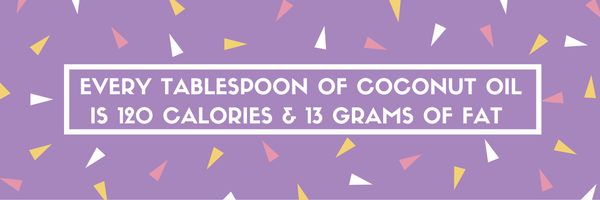
Now, that you know all the benefits of coconut oil, here are some different uses:
Cooking or frying. You can use coconut oil as the base of the pan when cooking or frying your favorite dish. It is especially good in a stir-fry! Many of my patients even like it in scrambled in their eggs!
Baking. You can use coconut oil in recipes to make sure your baked good come out nice and flaky. Make sure to melt the coconut oil first! Then you can use it in its liquid state to replace vegetable oil and butter in recipes.
Smoothies. One of the things I often put on my patient’s meal plans are smoothies. I always like to include a source of fat into smoothies. I find that smoothies are much more satisfying with fat! While peanut butter is often my go-to choice for chocolate based smoothies, I prefer coconut oil for fruit-based ones. I recommend putting about 1 tablespoon in a small glass cup and putting it in the microwave for about 15 seconds. This will liquify the oil. Then you can add it directly into the blender when making your smoothie.
Coffee or Tea. Coconut oil can make a great addition to your coffee or tea in the morning. We refer to this drink as bullet proof coffee. I know it sounds crazy but just try it! It makes the coffee super-duper creamy. Yum!

And … when in doubt – eat it by the spoonful.

There is no shame in taking a good ol’ spoonful of coconut oil. I guarantee it will make you smile. Just like these happy little spoons 🙂
If you are not a big fan of cooking or baking, you can get the same benefit by eating one spoonful of coconut oil per day as you would by using it in your meals.
In addition, topical coconut oil has been shown to have a positive effect when rubbed consistently on thinning hair related to PCOS. While I am only familiar with the dietary aspects of coconut oil, it seems like this often pops up in my reading. So I felt like it was fair to throw that out at you especially if hair loss is something you struggle with.
So I hoped you learned a thing or two about coconut oil. When consumed in addition to other heart health fats like olive oil, grass fed butter, nuts and avocados – coconut oil has the potential to have a positive impact on PCOS symptoms. While I am by no means advocating it as a “cure” for ALL PCOS symptoms – it certainly has the potential to help with some of the major ones like dyslipidemia, hypoglycemia, elevated weight and hypothyroidism. So please give it a try – I am pretty sure you will enjoy it! And remember – always buy organic, virgin (or extra-virgin) cold-pressed if you can and skip the refined stuff!
Are you a coconut oil fanatic? Do you have some fun, exciting ways to incorporate this oil into your diet? Our community would love to hear your thoughts. Please let us know in the comments below how you using coconut oil.


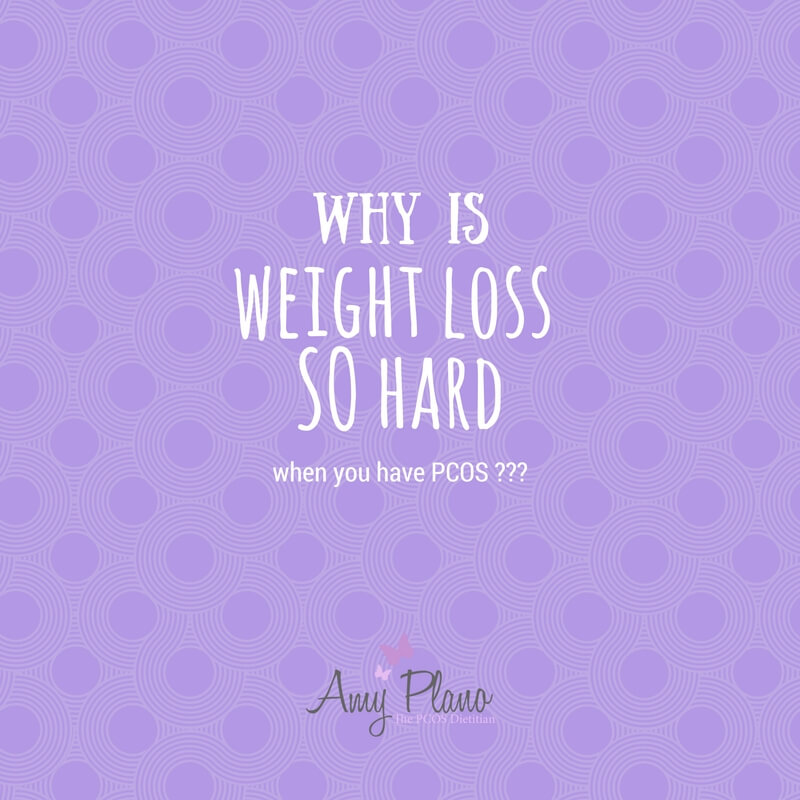
by AmyPlano | Sep 1, 2016 | PCOS and Weight Gain, PCOS Medications, Weight Loss
Why Is Weight Loss SO hard when you have PCOS?
Did you know that weight loss can help with improving almost all the symptoms of PCOS? Even a modest weight loss of 5 – 10 % of a woman’s initial weight can lead to improvements in insulin sensitivity, ovulation and fertility! But, I know this is easier said than done. Weight gain and weight loss are two of the most common issues women with PCOS are forced to deal with.
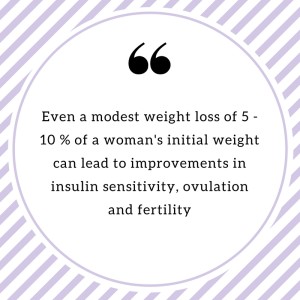
But, what gives ? Why is weight loss so hard if you have PCOS? Well my dietetic intern Jackie Budlowski and I are here to lay the smack down and give the 411 of why the heck it so friggin’ challenging to lose weight when you have PCOS. Get your notebook out — these are some golden nuggets of information 🙂
Insulin
I truly believe insulin is one of the most important hormones in controlling weight! Your pancreas secretes insulin to regulate your blood glucose levels. In most individuals, insulin helps lower one’s blood glucose levels by shuttling glucose into the cells where it can be used for energy. However, most women with PCOS do not effectively process glucose. They experience what is called insulin resistance.Their bodies are less sensitive to the effects of insulin. In response, the pancreas dumps out even more insulin, leading to high insulin levels, or what is known as hyperinsulinemia.
High levels of insulin signal to the body that energy is abundant. In turn, rather than use the extra energy as fuel, women with PCOS store excess glucose as fat. Therefore, one of the biggest keys to controlling weight is to regulate blood sugar and control insulin levels. This is best accomplished through a moderate carbohydrate diet supplemented with the insulin sensitizing agent metformin.
If you are not already familiar with the benefits of metformin please read my previous blog post which will bring you up to speed.
Slow Metabolism
Women with PCOS have been shown to have a slower metabolic rate. This is based on many factors but the primary one being the amount of body fat women with PCOS tend to carry. Your metabolic rate is the number of calories you need for your body and organs to work. You see, body fat is what I consider metabolically “dead.” It does nothing for you but kind of just hang there.
Muscle on the other hand is very thermogenic. It burns more calories than fat does – even while at rest. In fact, muscle tissue is about 8 times more metabolically demanding than fat. A higher percentage of lean body weight (muscles) results in a higher metabolism compared to people of the same weight with a lower percentage.
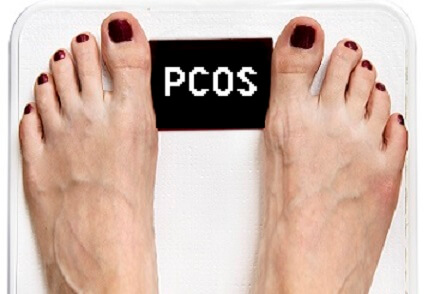
If you have a slower metabolic rate, this means you must consume fewer calories than the average woman. Eating more calories than you burn can lead to weight gain. In future blog posts we will discuss some of the different ways to improve your metabolic rate (Hint – Hint : strength training is definitely one of them!)
If you are curious what your metabolic rate is and you live in the Connecticut area shoot us an email at amy.plano@yahoo.com. We can set up a time to test your metabolism. We have a device called the Bodygem which tests your metabolism by using a simple breathing device. The Bodygem is the “gold standard” of metabolism testing devices. Don’t believe us ? Click here bodygem validation to review the research. The cost of the test is $150.00. You must be fasted, with no caffeine or exercise for 4 hours before the test.
Appetite Hormones
There are a number of hormones involved with hunger and appetite control. Ones of particular interest for women with PCOS are leptin, cholecystokinin (CCK) and insulin. These hormones are responsible for signaling to the body to tell it that is it full and to “stop eating.” Research has shown that women with PCOS have altered hormone signals, which may lead you to feel constantly hungry even when you are consuming enough calories. This leads to overeating, increases in body fat and overall lower esteem. Not a winning combination for weight loss.
Leptin
Did you know that your fat cells produce hormones? This is one reason women who carry a significant amount of body fat often have hormonal problems. One of the hormones produced by your fat cells is leptin. This hormone sends a signal to the hypothalamus gland in your brain when fat cells are full. Due to the fact that cells produce leptin in proportion to their size, overweight women with PCOS also have very high levels of leptin.
Given the way leptin is supposed to work, women who are overweight and have PCOS should have a diminished appetite. But we know this is not the case. You can have a lot of fat making a lot of leptin, but it doesn’t turn the hunger valve off. The brain isn’t listening. No drop in appetite. In fact, your brain might even think you’re starving. This because as far as it’s concerned, there’s not enough leptin! So you get even hungrier. This condition is known as leptin resistance. This causes an up regulation of appetite. This supports why women with PCOS tend to constantly be hungry despite taking in an ideal amount of calories.
Cholecystokinin (Alias: CCK)
Therefore, it may come at no surprise that women with PCOS often feel less satisfied after a meal than women without PCOS. This can be attributed to the hormone cholecystokinin (CCK). CCK is responsible for telling your body you are full after a meal. Women with PCOS are reported to secrete less CCK in response to a meal. So, if your CCK levels are lower, this means you will be hungrier after meals despite just eating. It has also been speculated that impaired CCK secretion may play a role in the greater frequency of binge eating in women with PCOS.
Not so awesome, right ? But the plot thickens …
Insulin
Lastly, insulin also acts as an appetite stimulating hormone. You may already be familiar with the concept of insulin resistance and PCOS. If you are not click here to brush up on your knowledInsulin resistance occurs when there is a lot of insulin being produced (such as, with many women who have PCOS), but the body and brain have stopped “listening” to insulin’s effects. The scenario becomes : you eat, your body releases insulin, but your body still tells you to eat more. So you eat more and increase the likelihood of storing the food you do eat as excess body fat. And if this is not bad enough – you rarely feel satisfied.Therefore, high levels of insulin may be one of the many reasons why you may experience more hunger than other people. Higher hunger levels inevitably leads to more eating which results in weight gain.
Just because it is harder to lose weight, doesn’t mean it is impossible. Here are some tips on how to take the bull-by-the-horns and make your hunger hormones work for you!
Weight loss & PCOS: How to manipulate your hunger hormones for weight loss
Pump up the protein
Do your best to have protein at all meals, but especially at breakfast. Breakfast sets the “appetite tone” for the day! Therefore, consuming high-quality protein sources such as eggs, Greek yogurt or cottage cheese with some nuts will help reduce your hunger hormones and keep your appetite at an even keel throughout the day.
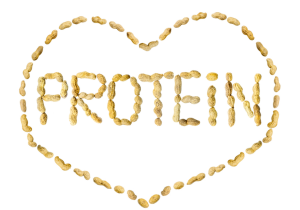
Skip the processed carbs (duh!)
Stay away from refined-carbohydrate-only meals and snacks such as cereal, a bowl of pasta, crackers, chips and starchy snacks. Even having a healthy snack such as fruit alone can trigger a spike and an immediate drop in insulin, so add some nuts, a piece of cheese or Greek yogurt to your fruit.
Focus on high fiber foods
Fiber is deeply tied to satiety. High volume, low-calorie, nutrient dense foods delay gastric emptying keeping food in the stomach for a longer period. Therefore, do your best to include foods such a vegetables, high fiber cereals, fruit and legumes to keep hunger at bay. The goal is aim for 25-30 grams of fiber spread throughout the day.
Eat a diet rich in omega-3 fatty acids to boost leptin
People who are overweight tend to release too much of a group of molecules that the body uses to combat inflammation. These molecules reduce leptin’s ability to communicate with the brain. They are thought to be one of the underlying causes of leptin resistance. Omega-3 fatty acids decrease the production of these molecules by reducing inflammation in the body. The body does not produce omega-3 fatty acid therefore you must get from the diet. Foods high in omega-3 fatty acids include grass-fed meats, walnuts the fattier fish salmon, anchovies, sardines, mackerel, trout as well as chia seeds, flax seeds, summer squash and kale. Aim for about 800 – 1000 mg per day.
Foods high in omega-3 fatty acids include grass-fed meats, walnuts the fattier fish salmon, anchovies, sardines, mackerel, trout as well as chia seeds, flax seeds, summer squash and kale. Aim for about 800 – 1000 mg per day.
While the hormones that effect and control your hunger might be seen as complex, the three I’ve just discussed are keys to to unravelling this complicated web of PCOS, hunger and weight gain. As you can see, there are many factors at play, beyond just your determination to eat properly. These are factors I want you think about when you become frustrated with your PCOS and weight gain.What is important to understand is that your behavior around eating is not always something you can always consciously regulate.
Be confident and believe in yourself. Weight loss may initially be a struggle, but with the proper approach I am confident you can do it!


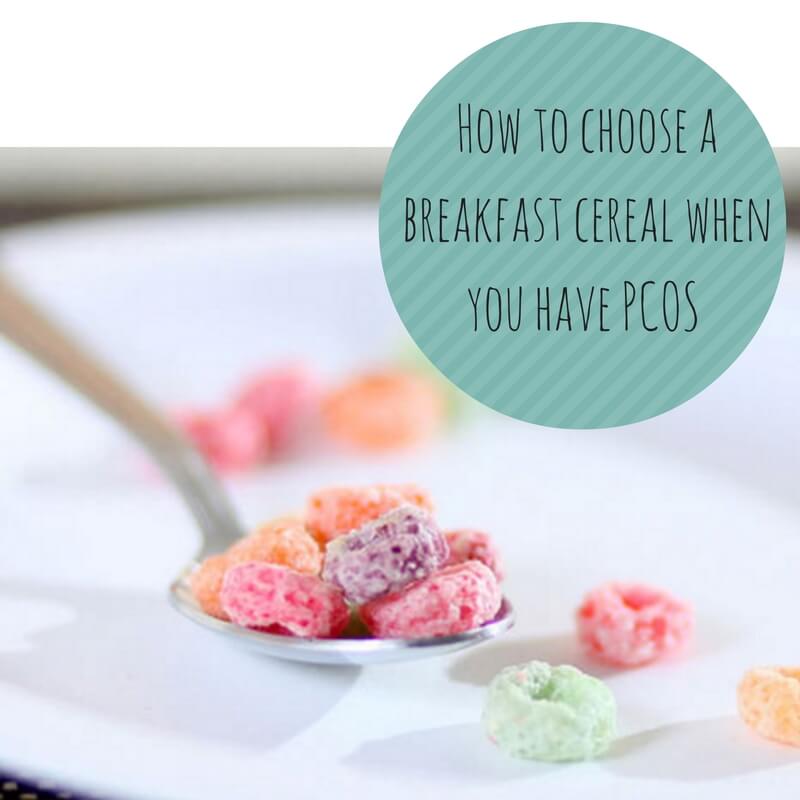
by AmyPlano | Aug 21, 2016 | PCOS Breakfast Foods
PCOS friendly cereals – Do they even exist?
So as a Powerful Chick with Outrageous Spirit I know what you are thinking.

PCOS friendly cereals do in fat exist. However, while I am certainly not advocating cereals along the like of Lucky Charms and Golden Grahams every day (although those do happen to be some of my favorites!) I do think there can be a place in the diet of the PCOSers for cereal. It is just as important to know which cereals to choose. Time to put our label reading glasses on and get to work.
Don’t Be Fooled
Information on the front of the box can be misleading. A lot of PCOSers look for products that state “low in sugar,” in an effort to watch their carbohydrates. Unfortunately, a cereal claiming to be “low in sugar” might not be as equally as awesome in terms of fat, whole grains, or sodium. Therefore, it important to read both the nutrition information panel as well as the ingredients to make the most educated decisions when it comes to PCOS friendly cereals.
Wholly grains
I say it a lot, and I’ll continue to do so: Whole grains and foods that contain whole grains provide a heck of a lot health benefits (especially for women with PCOS!). Whole grains contain all three parts of the grain along with fiber and many other nutrients such as B vitamins, vitamin E and magnesium.
Check the ingredient list on the cereal box. The first item listed should be a whole grain. Examples include but are not limited to whole wheat, whole-grain corn, barley, oats, oatmeal, millet, quinoa and wheat berries.
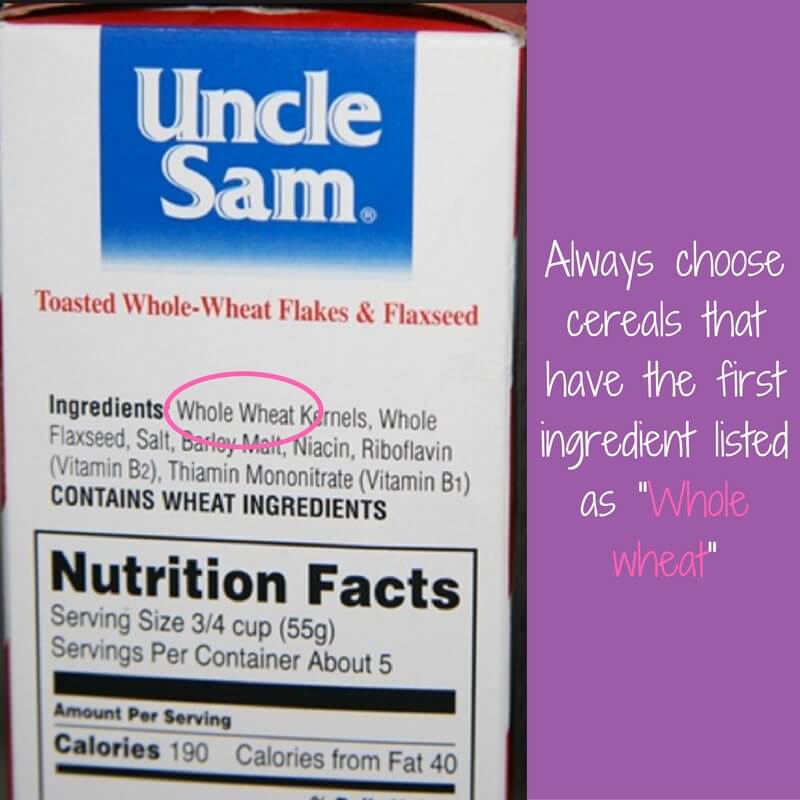
The words “multigrain,” “wheat,” “wheat germ,” and “bran” are not necessarily indicators of a whole grain. These terms may simply mean part of the grain is missing. Or in some cases the ingredient multigrain may imply many grains none of which are whole. Sneaky!
Fill up on Fiber
The health benefits of fiber and PCOS are endless. Research supports that diets that are high in fiber help lower blood sugar, assist with weight loss, lower cholesterol and help us poop. For women with PCOS, I would love for you get at least 30 grams of fiber per day. In an effort to meet these goals try to aim for cereal with at least 3 grams of fiber per serving.
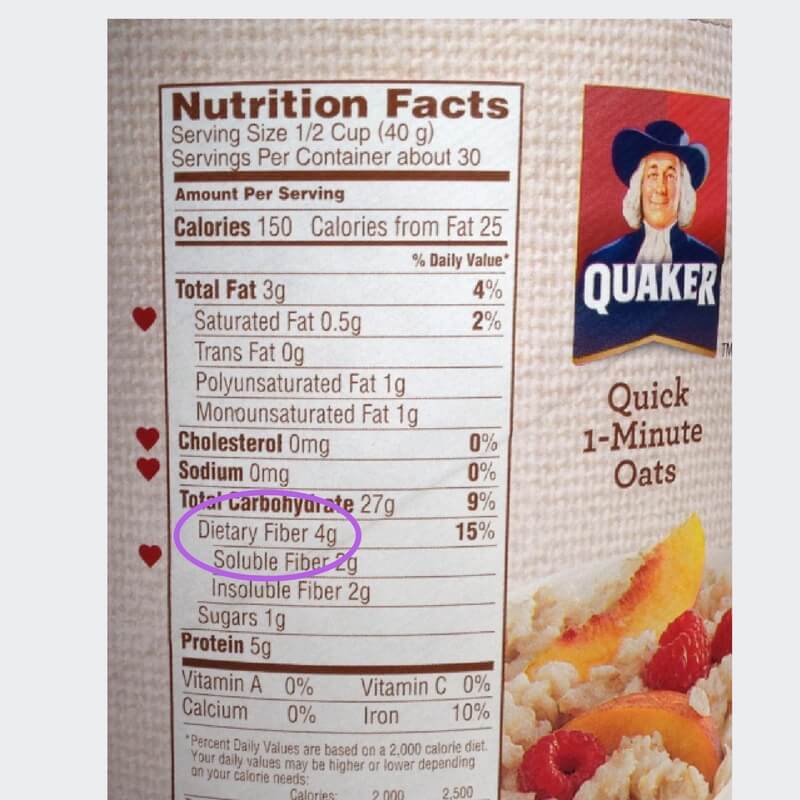
As you can see here, quick 1-minute oats have a whopping 4 grams of fiber. This is an excellent example of a high fiber cereal.
Limit the unhealthy fats
Saturated and trans fats are the bad guys. Fortunately for us, most PCOS friendly cereals are low in saturated fat and most have no trans fat. But if you’re a granola groupie, look out, as many granolas may contain saturated fat and contain more total fat than a bowl of French fries! And you thought all granolas were healthy…sadly not.
Look for cereals with zero grams of saturated fat and choose those with fewer than 4 grams total fat per serving.
Steer clear of high-sugar cereals they are of no benefit for women with PCOS
As a PCOSer sugar is the first thing that often comes to mind when you hear the word cereal. Given the high sugar content of many cereals you are often better off eating a bowl of crumbled up cookies and milk for breakfast. A good rule of thumb is to stick with cereals that have no more than 8–10 grams of sugar per serving. That’s roughly two teaspoons of sugar. Less is even better!

Note – In effort to optimize blood glucose control, remember to also look at the total carbohydrate grams (after checking out the serving size, of course), not just the grams of sugar. Try to aim for less than 35 grams of total carbohydrates per serving. But as a matter of principle, it pays to check out the grams of sugar on cereal labels.
Women with PCOS should seek out cereals that contain a modest amount of protein
Protein, as well as fat, plays a key role in extinguishing hunger. Ingesting protein provides staying power, so it may help you control the munchies. Look for PCOS friendly cereals with 3 or more grams of protein per serving. You’ll also get protein from the milk you add to your cereal. By adding 1 cup of 1 % milk to your cereal you are adding 8 grams of protein to your meal. For even more protein stir your cereal into some plain greek yogurt for an extra 12-18 grams of protein. Boom!
Shy away from sodium
Cereal is probably not the first food to come to mind when you think about high sodium foods. But surprisingly, some cereals contain some hidden sources. For example, one half-cup of Post Grape-Nuts contains 290 milligrams of sodium. General Mills Wheat Chex contains 270 milligrams per 3/4 cup serving. Stick with PCOS friendly cereals that contain less than 200 milligrams per serving.
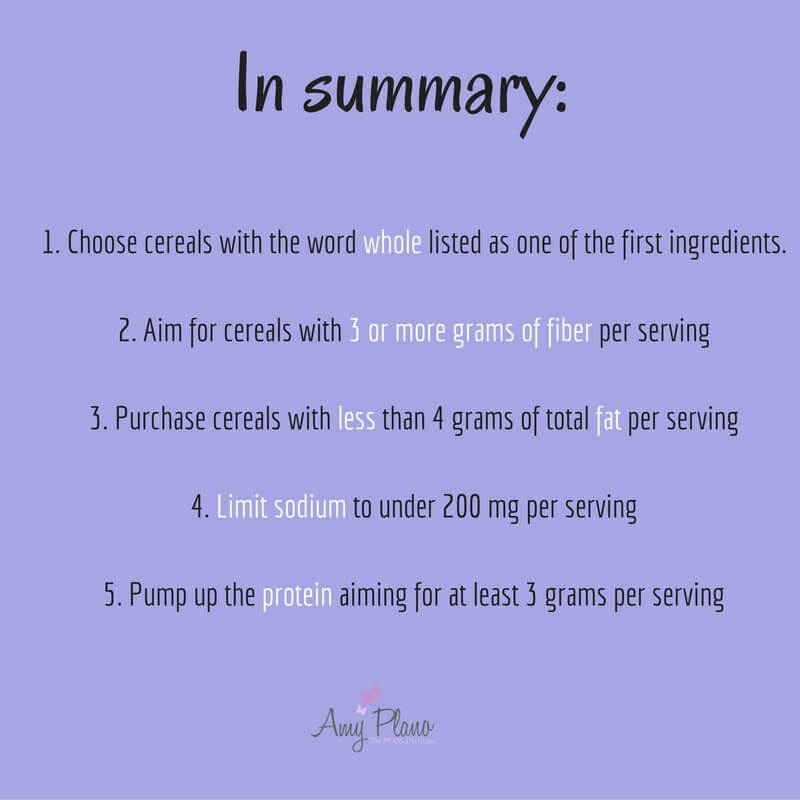
There is no denying it that you PCOSers love your cereal ♥ But by following the above guidelines you can steer away from cereals that damper your metabolism and choose those with some nutritional merit. As a rule of thumb I would recommend that women with PCOS consume cereal no more 1-2 times per week. While it certainly does have some nutritional value, there are other more quality breakfast foods I would love you to choose.


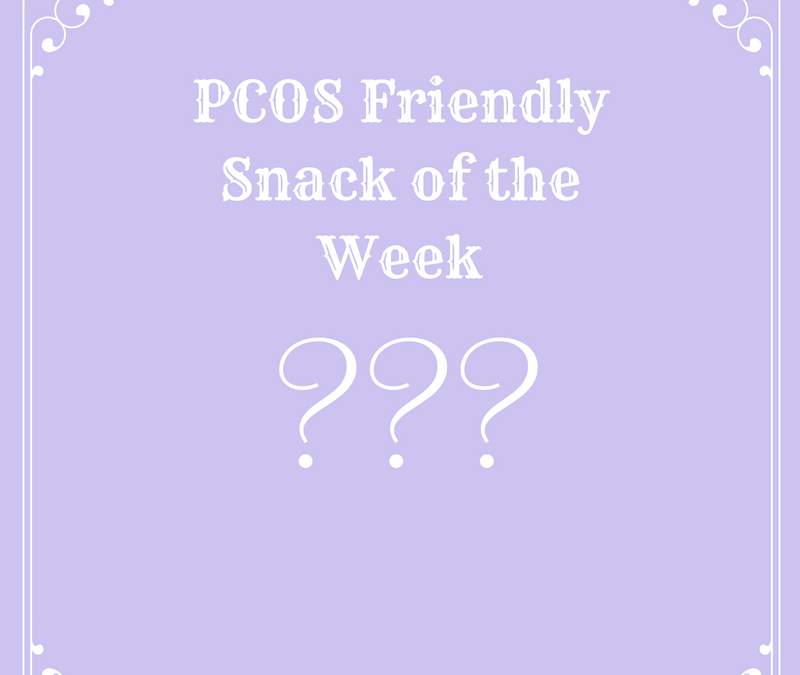
by AmyPlano | Jul 28, 2016 | PCOS snacks
PCOS friendly snack of the Week
Happy Thursday Y’All! Today I wanted to share with you my favorite PCOS friendly snack of the week.
So I have been thinking lately — and one of the questions I often get from women who have PCOS is, “What can I snack on?” I thought it would be helpful to provide you with a PCOS friendly snack that checks all the boxes. These might be snacks that I am already recommending – or they might be new finds (you know I heart grocery stores!) I want to introduce to the PCOS community. So onward to the method to my madness!

If you have already worked with me you know that I look at all foods in context of the allowable carbohydrates for the whole day. What that means is – everything works around your daily carbohydrate budget.
So if you have a carbohydrate budget of 120 grams per day (think about it like I am giving you $120 to spend on carbs!) – and you spend 30 grams on each breakfast, lunch and dinner you have used 90 grams of your allowable carbohydrates. This leaves you with 30 grams of carbohydrates to spend on snacks! Yay – hooray! So what count as a PCOS friendly snack? I thought you would never ask!
What is a PCOS Friendly Snack?
Typically I like to see 2-3 snacks per day for women with PCOS. These snacks can range anywhere from 0 – 20 grams of carbohydrates and from 50 – 150 calories. I set the upper limit at around 20 grams of carbohydrates as I want to minimize any excessive spikes in insulin.
So now that you the know the “why” now let me tell you the PCOS friendly snack I am enjoying this week.

Just like everyone I get bored with snacks. So this week when I was in Traders I on the hunt for something different. The Trader Joes Unsalted Peanut Butter Filled Pretzels caught my eye for numerous reasons and of course ended up in my cart! But you may be asking ….
What Makes Trader Joes Peanut Butter Filled Pretzels a PCOS friendly snack ?
Serving Size
First check out the serving size! You get 11 pretzels for 140 calories. That’s not too shabby. Calorie wise this fits my criteria of being > 150 calories. Score!
Baby got fat! And that is a GOOD Thing!
Next – I love the fact that this snack has a decent amount of fat – 8 grams to be exact. I like snacks that have fat (and protein, too!) in them as I find they provide a certain level of fullness many women with PCOS need. When people eat foods that are low in fats – they tend to not be very filling. What this means is that in no time – their stomachs are growling and they are prowling for the next snack. Remember – the goal of snacking is to stabilize blood sugar and help curve hunger. The 8 grams of fat in these little nuggets should definitely help with that!
Low in Carbohydrates
Carbohydrate- wise these pretzels are a score – they only have 14 grams of carbs per 11 pretzels. They also have 2 grams of fiber in them as they are made from wheat flour. This should add to the fat content and contribute to your feeling of fullness when you eat this little suckers.
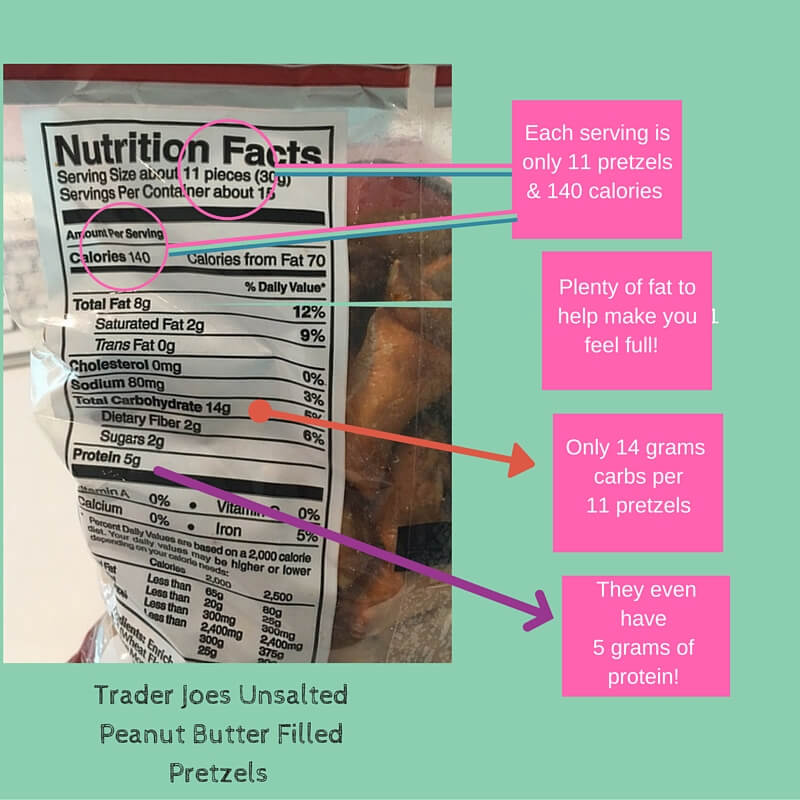
Push the Protein
While they are not what I would consider a high protein snack (I consider foods with > 8 grams of protein per serving a higher protein snack) – they do have 5 grams of protein. It is no surprise that high-protein snacks, as well as balanced meals, have been linked to increased satiety.
In fact, several studies have suggested that protein-containing snacking have the potential to boost satiety and facilitate weight loss. In a longitudinal study, researchers gave 17 men and women with type 2 diabetes moderately high-protein morning and afternoon snacks (5 g to 12 g of protein) for four weeks, and compared the results with their normal eating habits for four weeks. The subjects who ate the two high-protein snacks lost a modest but significant amount of weight (1 kg) during the four-week period. Researchers noted that the subjects’ weight reduction occurred without making any changes in total energy intake (1).
Therefore, not only are these pretzels delicious – they can help promote weight loss. Did someone say winner-winner chicken dinner!?!
Low in Sodium
Sodium wise – they this PCOS friendly snack is a home run. They only have 80 mg of sodium per serving. I like to keep snacks < 300 mg of sodium whenever possible. We know that many women who have PCOS are pre-disposed to heart disease and hypertension. So in light of that information there is no need to “sodium bomb” anyone! Of note – Trader Joe’s does sell a salted version of these pretzels – but they have about 200 mg more of salt per serving.

Magic in your Mouth
It goes without saying that these pretzels taste amazing. They have just the right amount of peanut butter – not too much and definitely not too little. I have tried both the salted and the non-salted version and I actually prefer this version to the former. Most pretzels all you taste is the salt – not these guys. All you taste is the crunchy goodness – and for only 14 grams of carbs these are a true winner in the PCOS snack bag. They are just SO good!
So I would love to know what YOU are snacking on. Have you tried Trader Joe’s Peanut Butter filled pretzels? If SO what ya’ think? Love or hate? What’s in your snack cabinet? Let us know in the comments below. As you know we can never have too many awesome snacks that are PCOS friendly!
Need other suggestions for PCOS friendly snacks? Check out one of my other blog posts that sure to delight your sweet tooth!


References:
1. Navas-Carretero S, Abete I, Zulet MA, Martinez JA. Chronologically scheduled snacking with high-protein products within the habitual diet in type-2 diabetes patients leads to a fat mass loss: a longitudinal study. Nutr J. 2011;10:74.























